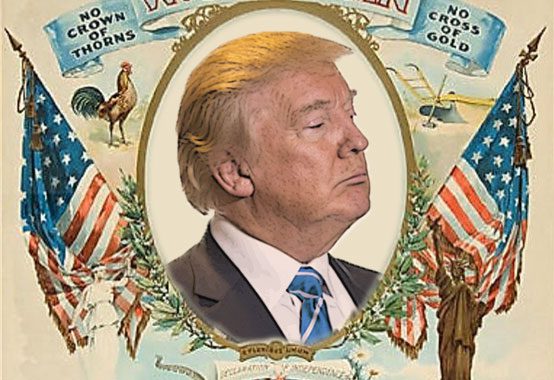GOP Congressman: Trump Losing Me on Foreign Policy

A few days before the 2000 elections, I hosted the Duncan Family Barbecue at the Knoxville Civic Coliseum, which aside from free food, always features bands, choirs, and top names from the Country music and Oldies worlds, drawing upwards of 10,000 people.
Governor George W. Bush, then the Republican Presidential nominee, walked out to the podium to the sound of the University of Tennessee Pep Band. After his speech, I walked him back to his vehicle parked in the bowels of the coliseum, and I told him “Governor, you are going to carry Tennessee.” He replied: “If I do, I will win the election,” and that is exactly what happened.
Later that night, one of my sons said, “Dad, I have never heard you so excited as when you said, “The next President of the United States!” when introducing Gov. Bush. In truth, I was excited, primarily because Gov. Bush said almost every day on the campaign trail that what we needed was a more humble foreign policy and we should not be in the business of nation building.
That didn’t last. President Bush did almost nothing to rein in federal spending, supported No Child Left Behind and other big government initiatives, and in response to the 9/11 attacks, caved to the prevailing neoconservative interventionist foreign policy in Washington.
Columnist George Will once wrote that the neocons were “magnificently misnamed” and were really “the most radical people in this City.” After 16 years of failed war policies, it could be said that they were also the worst people Bush could have turned to in crisis.
Now, disappointment is settling in once again. I was one of the earliest members of Congress to endorse then-candidate Trump. I did it primarily because he seemed to be the least-hawkish of all the Republicans running for President. As a result, I was one of six members of the House, (along with Sen. Jeff Sessions, R-AL.) who was invited to the Mayflower Hotel in Washington to hear Mr. Trump’s first major foreign policy speech on April 27, 2016.
That speech was filled ideas and sentiments that could have been taken straight from the pages of the American Conservative Magazine.
It was a non-interventionist, anti-nation-building, America First speech.
On many occasions since then—in debates, at rallies, and in tweets—Mr. Trump consistently criticized the wars in Afghanistan and Iraq. I was so inspired that I later wrote an article for the American Conservative published on Sept. 26, 2016, entitled “Trump vs. the GOP Elite.”
In it I wrote that I was supporting Trump because of his stands on six major issues: courts, trade, immigration, jobs, healthcare, and especially, war. I pointed out that I was the last Republican left in Congress who had actually voted against going to war in Iraq (at the time there were seven, six in the House and one in the Senate).
“The American people are tired of permanent, forever wars” I wrote, adding, “Finally, and most importantly, (Trump) does not seem (like so many leaders today) to have a need to turn every two-bit dictator into another Hitler so he can prove himself to be another Winston Churchill.”
When I heard that President Trump was going to address the Nation about Afghanistan, I hoped he would say we were ending this wasteful, needless war that had already cost this country so much in dead and maimed young people and close to a trillion dollars in costs. I had hoped but doubted, as he has chosen to fill his inner circle with military generals.
Needless to say, he gave a speech that cheered the likes of Sens. John McCain, Lindsey Graham, and the neoconservative foreign policy establishment, going back on so many of his campaign pledges.
Jeff Greenfield writing in the Politico Magazine, put it best: “This is why it’s hard not to feel a pang of sympathy for those who believed that Donald Trump’s years of opposition to foreign entanglements would actually lead to the reversal of decades of often disastrous interventions in every corner of the world.”
“On Monday night,” he added, “they heard him wrap the betrayal of their fondest hopes in the very rhetoric that had convinced them he would take their side.”
Meanwhile, radio host Laura Ingraham wisely asked if 100,000 troops a few years ago could not “win the war,” how would 4,000 (added to the current 8,400) more clean up the mess now?
Col. Douglas Macgregor wrote in The Washington Times three weeks before the President’s speech that “Sending four, five or fifty thousand Soldiers and Marines to train the Afghan army and police, let alone drive back the Taliban will make no impression on Afghanistan or the millions of Muslims who live there. Afghanistan’s hopelessly corrupt government, military and police cannot be transformed into replicas of Western armies.”
As many have pointed out, Afghanistan has been called the “graveyard of empires” for a reason. Britain tried and failed. Russia tried and failed. We’ve had 17 years to make it work but even Secretary of Defense James Mattis testified that we were still losing there.
I will continue to support the President in every way that I can, but I hope he will very quickly get back to the America First agenda he so forcefully advocated in his campaign.
Rep. John J. Duncan Jr. represents the 2nd district of Tennessee in the U.S. House of Representatives.
Comments